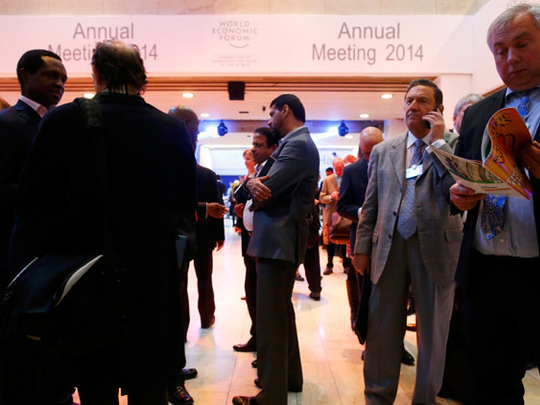
Davos: The weather has been very changeable at Davos this year which has had its impact. We arrived in deep fog, but the second day was brilliantly sunny with the gleaming white mountains towering over the village. But while the sunshine was cheering, it also had the effect of melting the ice and snow, so we were all walking about in the mush as we went outside the Congress Centre to our meetings in the various hotels around Davos.
This was not a major problem, even if rather messy. The real problem was on the third day when the clouds came back and the pavements all refroze, leaving a lot of very slippery ice, which then received a deep snowfall of many inches, making it treacherous to move around. Participants wearing decent snow boots were at a great advantage, whereas those in standard office shoes were suffering, even if they had the all-important spiked galoshes which go over the shoes and offer some grip.
The heavier shuttle buses managed to keep ploughing through the snow, but many of the private cars had to put on their snow chains to make it up the steeper connecting lanes.
The final working day of the Annual Meeting looks sunny, and the streets of Davos and Klosters have a curious mix of people as the earnest participants at the World Economic Forum clash with the many groups of weekend skiers. The Forum participants in their office clothing and prominent badges do not have much common ground with the skiers in their bright snow clothing, and heavy ski boots crunching along the pavements.
As always at the World Economic Forum, it is not possible to be everywhere. There are whole strands of the conference that are following their agendas that I have not been able to touch. There have been some interesting sessions on the global water crisis, and the need move to a sustainable use of water which has a major impact on agriculture and energy. There have been some important sessions on developing public policy to deal with health. I found myself talking to a professor from Cambridge University whose areas of expertise was dementia and how better treatment should be implemented.
There have been some very detailed sessions on the digital world and how it impacts both business and society, with both practitioners and academics looking far into the future to imagine what is both possible and desirable.
But I only realised how very different were some of the strands of the conference when I accidentally met Dr Ahmad Sarmast as we both were desperately looking for a mid-afternoon coffee. Once we had our all-important reviving cups, we chatted and he told me he was the director of the Afghanistan National Institute of Music, which was opened in 2010 to offer young Afghans professional training in both Afghan traditional and western classical music. He told me that he has developed an orchestra that performs in both traditions, and is due to perform in Muscat’s Royal Opera House in a few weeks.
He had been delighted at the warm reception that his talk about his institute had been given by the other participants at the World Economic Forum, and he spoke of some new opportunities that may emerge from this Annual Meeting.
Dr Sarmast was a modest man, and it took me some time in our conversation to take on board the extent of his achievement. It was astonishing to find someone with such verve coming from such a troubled country
His institute is part of the Afghan Ministry of Education, and was set up with the support of Monash University in Australia, and uses courses based on the British national curriculum. The institute has full time students and also takes music courses into primary and secondary schools, and it has taught many hundreds of students since it started in 2010.
This story seems simple, but Dr Sarmast started planning the institute in 2006 when the fighting between the Taliban and Nato forces backing the Afghan army was at its height. In this grim situation, he somehow got the Australians to support the idea, and the Afghan government to commit to the plan, and then he found the right building, and set it up with soundproof rooms and performing halls, and then found the right staff. All this takes time and perseverance, and a lot of money and support.
Bumping into people like Dr Sarmast, and hearing him talk of the importance of music in all our lives, never mind the benefits that music brings to the young people of Afghanistan, was an important reminder that not all global affairs are about security and the fiscal crisis. We all have an inner self which needs as much attention as anything else.












